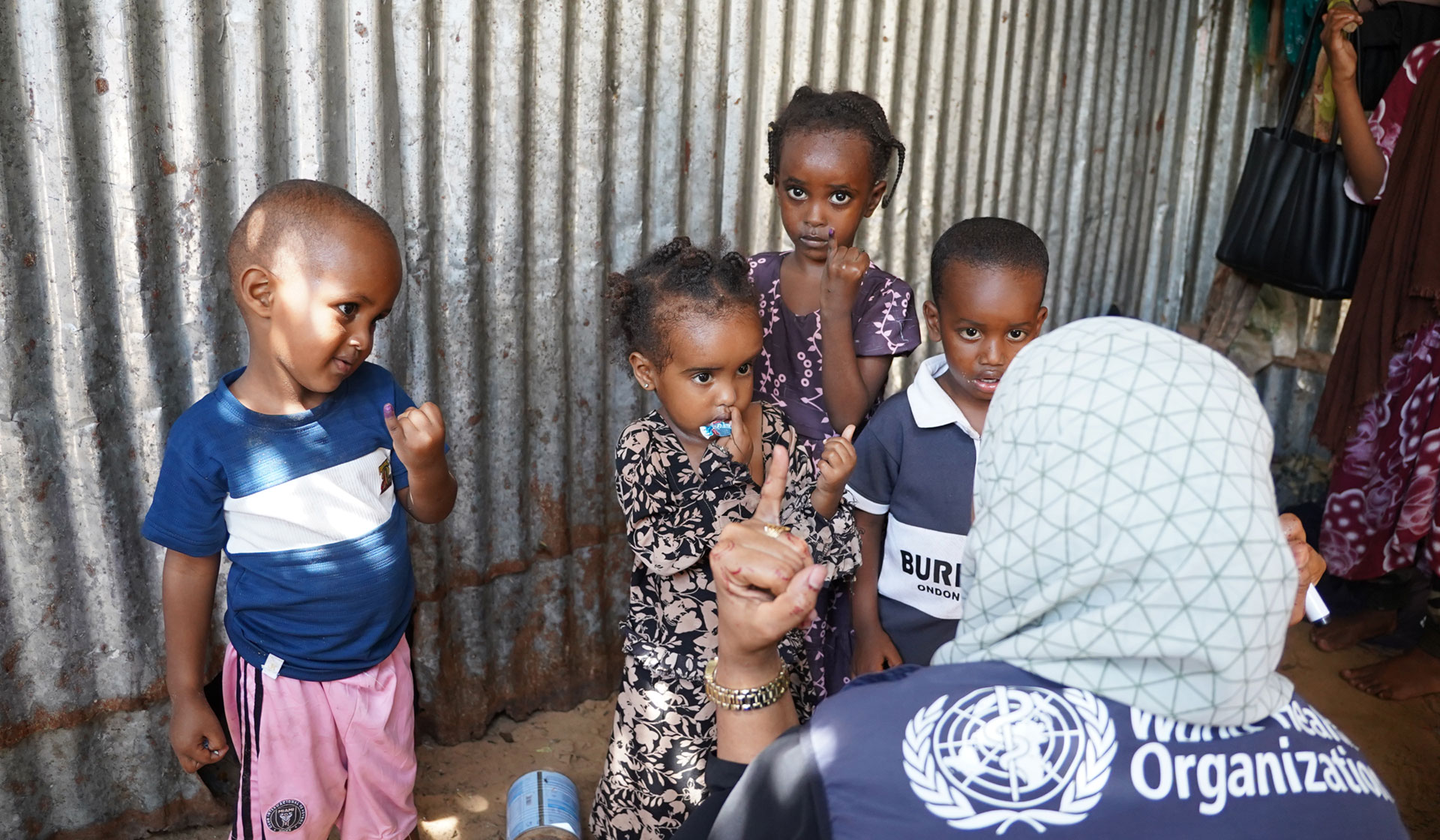
27 October 2025 – The first annual progress report on the Strategic framework for the implementation of Immunization Agenda 2030 in the Eastern Mediterranean Region shows both progress and pressing challenges in vaccine equity and disease prevention.
Immunization Agenda 2030 (IA2030) envisions a world where everyone, everywhere, at every age, fully benefits from vaccines to improve health and well-being. It aims to maintain hard-won gains in immunization, recover from the disruptions caused by COVID-19 pandemic, and achieve even more – by leaving no one behind, in any situation or at any stage of life. The Strategic framework guides countries in the Region towards stronger immunization systems, broader vaccine coverage and greater equity in access, especially in conflict-affected and hard-to-reach areas.
The following are among the findings of the progress report.
Disease prevention
Poliovirus has been eliminated in 20 of the Region’s 22 countries and territories, unchanged since 2019. Egypt joined Bahrain, the Islamic Republic of Iran and Oman in measles and rubella elimination. However, the Region experienced increased outbreaks of cholera, measles and vaccine-derived poliovirus between 2019 and 2024.
Equity
While 41 new vaccines have been introduced across the Region since 2019, including COVID-19 vaccines in all countries, the number of zero-dose children rose from 2 million in 2019 to 2.8 million in 2024. Routine coverage of DTP1 declined from 89% in 2019 to 85% in 2024.
Building strong immunization programmes
Diphtheria, tetanus toxoid and pertussis containing vaccine third dose (DTP3) coverage dropped from 84% in 2019 to 79% in 2024. Measles-containing vaccine second dose (MCV2) coverage remained at 75% and pneumococcal conjugate vaccine third dose (PCV3) coverage dropped from 56% to 53%. HPV vaccine coverage increased to 1% in 2024 from 0% in 2019.
The report tracks progress across the 7 strategic priorities (SPs) of IA2030.
Under SP1 (Immunization Programmes for Primary Health Care/UHC), all 22 countries now have national immunization technical advisory groups, with 19 countries (86%) meeting functionality criteria, and 17 countries (77%) have a valid national immunization strategy.
Under SP2 (Commitment and Demand), the number of countries with supportive immunization laws increased to 17 (77%), though fewer countries are implementing behavioural or social strategies, down to 10 (45%).
Progress on SP3 (Coverage and Equity) reveals mixed results. The number of countries with >90% of districts achieving 90% or higher DTP3 coverage fell from 5 to 3. Countries with 100% of districts reaching 95% or higher coverage for MCV1 and MCV2 dropped from 4 to 2.
Under SP4 (Life Course and Integration), HPV vaccine introduction rose from 2 (9%) to 7 (32%), with high-income countries leading.
Reporting on SP5 (Outbreaks and Emergencies) remains limited. While outbreaks have increased, just 3 countries shared vaccination response data for 960 measles outbreaks.
Under SP6 (Supply and Sustainability), of the 6 countries reporting vaccine financing data, 4 showed stable or increased spending.
SP7 (Research and Innovation) saw the number of countries with a national immunization research agenda grow from 2 in 2019 to 5 countries in 2024.
The report’s findings highlight some progress alongside gaps that need urgent attention. The report outlines several major barriers to progress such as data quality and reporting gaps, insecurity and humanitarian access constraints, rising vaccine hesitancy, especially post-COVID-19, growing outbreak frequency with delayed response and limited access to new vaccines in many middle-income countries.
The way forward
To stay on track towards IA2030 goals, WHO calls on countries to:
implement strategies to vaccinate all unvaccinated and partially vaccinated children up to 5 years of age;
ensure timely submission of annual electronic Joint Reporting Form (eJRF) reports and monthly subnational immunization coverage reports to WHO;
investigate and respond to vaccine-preventable disease outbreaks promptly, documenting and sharing information with WHO;
fast-track quality implementation of high-risk approaches in countries yet to eliminate maternal and neonatal tetanus;
collaborate with WHO to prepare and submit progress reports for verification for measles and rubella elimination;
leverage polio resources to strengthen routine immunization and meet IA2030 goals; and
establish systems to improve data collection and reporting on outbreaks and emergencies under SP5 (Outbreaks and Emergencies).
The Region has shown that progress is possible, but urgent action is needed to close equity gaps and prevent backsliding on vaccine-preventable diseases.
The progress report is among the documents of the Seventy-second session of the WHO Regional Committee for the Eastern Mediterranean (RC72), held between 15 and17 October 2025.








